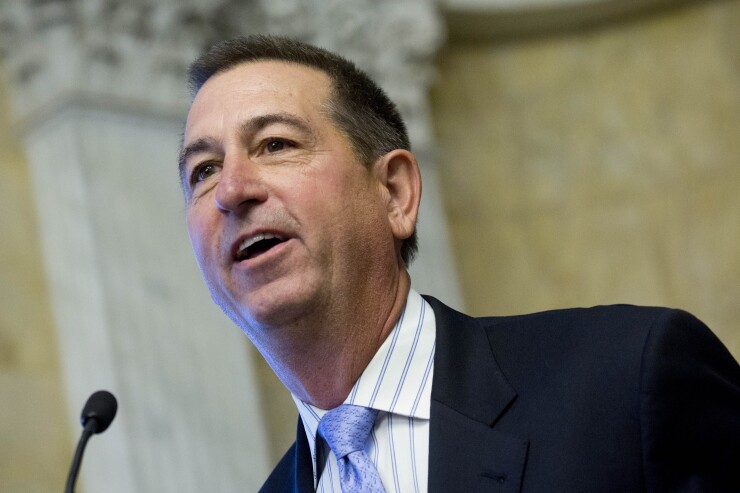The Office of the Comptroller of the Currency’s plan to
Typically, the federal bank regulators — the OCC, Federal Deposit Insurance Corp. and Federal Reserve Board — embark on rulemakings jointly, which is the approach you'd expect for one as consequential as a
But they evidently are not at the same page yet. The OCC says it will release its own advance notice of proposed rulemaking — amid reports that the agencies disagree on a CRA policy — that will not make any recommendations but will seek public comment on a path forward.
For now, the decision to move forward poses few risks to the agency as it enters an information-gathering phase for future reforms. It will be critical to see if the agencies can get on the same page before rulemaking gets further along.

The OCC’s initial step here is not surprising. Comptroller Joseph Otting has been intently focused on moving the CRA ball forward since he took the agency’s reins last year, and has discussed the idea before of the OCC
An OCC spokesman stressed again on Monday that an ANPR would not have any policy implications.
“It’s not unprecedented for agencies to issue ANPRs independently and move forward with actual rule proposals on an interagency basis later,” the spokesman, Bryan Hubbard, said in an interview. “It continues the process, it avoids unnecessary delays later and ideally it will produce a rule that will expand lending and investments to the communities that need it most, sooner rather than waiting.”
Indeed, the OCC went ahead on its own ANPR on a separate issue as recently as last year, when under then-acting Comptroller Keith Noreika, it asked for public comment on changes to the Volcker Rule. But the regulators later acted jointly when all three joined the proposal unveiled in May to reform compliance procedures for the proprietary trading ban.
Other past examples of regulators deviating from a common policy approach involved more explicit differences. In April, the Fed and OCC
Yet the agencies move in unison in the vast majority of cases. Unilateral approaches to bank regulation are risky, simply because they suggest a different set of regulatory expectations for different types of bank charters. That opens the door not only to regulatory arbitrage but also a parent holding company having different sets of rules for different institutions under its corporate umbrella.
Such a scenario with CRA — which is already a complex law with a web of supervisory policy issues — is somewhat unthinkable. While banks under the OCC’s watch are the biggest in the industry by asset totals, they make up only 21% of the charters. By contrast, the FDIC supervises over 60% of the nation’s banks.
Hubbard says the agency is not interested in such a go-it-alone approach.
“We intend to provide all the comments to our federal regulators and hope to pursue a rulemaking jointly,” he said.
That underscores the importance of an interagency dialogue continuing in one form or another.
If the agencies have hit a wall on revising CRA policy differences, putting out an ANPR could also have its advantages, by getting the debate more out in the open and offering outside public perspectives from banks, consumer groups and other stakeholders on issues that for now are being debated internally.
Bankshot is American Banker’s column for real-time analysis of today's news.





